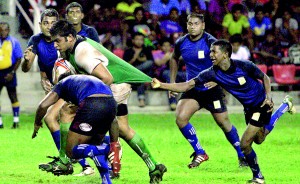Gratiaen Cup played with a touch of grace
View(s):On Thursday the 25th the Gratiaen Cup Rugby encounter was revived at Havelock Park after a lapse of almost 30 years. This game, played under floodlights, doubled for the selection of the Under 19 team that is to play in the Asian Junior Championship, which begins on August 11 in Chinese Taipei.
The Gratiaen Cup was a traditional match played between Colombo Schools and Outstation Schools which commenced in 1958. On revival, it is played between the Western Province and the Central Province. S. Thomas’ College was then grouped under Outstation Schools but today they play under the Western Province flag. The game was last played in 1983 and the Outstation Schools team was captained by Asanga Seneviratne and Colombo Schools was captained by Shabben Siddik. Asanga, who is the present President of the SLRFU, has been instrumental in reviving the traditional match. Western Province took the lead in organizing the fixture this year.

The Gratiaen Cup U-20 Rugby match between Western and Central provinces was revived after 30 years last Thursday at Havelock Park under lights.
The trophy this year was won by the Western Province by 20 points to 17. There was a motley crowd of rugby enthusiasts at Havelock Park to watch this match played under lights. It was evident that the nostalgia attached to the traditional fixture was a reason behind many of the spectators’ presence at the ground. I had the opportunity to talk to Rohantha Pieris, who played in the Gratiaen Cup in 1977/78. A recent newspaper article about big matches being places to meet old friends also mentions Rohantha, who used the quick throw in the Premadasa Trophy final that brought the Cup to CR. It was a question of knowing the new law and using same. That is a point in rugby among many others that I too remember of Rohantha. The author went on to say, “The pertinent point is that you have to know the rules and know them well. You have to know all the rules in fact because this gives you the privilege of choice. And if you take the broader meaning of ‘rule’, i.e. in relation to ethical frames, it would be less likely that you will be stumped by your inevitable human frailty.”
This game was also an opportunity for players to demonstrate their talent to the selectors who were there to pick the Sri Lankan Junior squad. One remembers the season for many moments of unwanted action that took centre stage while the good old spirit of rugby was lost. In a situation of having to play to get an opportunity to represent the country one would have expected impatience resulting in unwarranted play. The beauty was that whole game had no such incident. I have always implied that there are things that happen which are not within the laws of the game but happen in the course of the game and are penalised. An example could be an offside or a player committed to a tackle that may be late and are penalised. There are others such as kicking a player on the ground or putting your fingers in the eye of an opponent in a scrum or maul. That is not within the game and is not only penalised but the player may be sent off or temporarily suspended. None of these ever happened in this match. The coaches never shouted at their charges or the match officials. Nobody asked the AR to tell the ****** referee to look at this or that. Those coaches too were probably looked at to lead the Junior National team forward and were under pressure to perform.
 What was the difference during the season then? I think it was the non-attendance of missiles in the form of fans who forget who they are and why they are there. Or is it the money that is supposed to have been spent or the misguided behaviour in wanting to be conspicuous as a loyal product of the school who wants his school to win thus becoming hooligans? There were enough opportunities to let misguided vengeance speak as the match officials let a few off-sides etc. go unchecked as the need to use the law was contextually different.
What was the difference during the season then? I think it was the non-attendance of missiles in the form of fans who forget who they are and why they are there. Or is it the money that is supposed to have been spent or the misguided behaviour in wanting to be conspicuous as a loyal product of the school who wants his school to win thus becoming hooligans? There were enough opportunities to let misguided vengeance speak as the match officials let a few off-sides etc. go unchecked as the need to use the law was contextually different.
I did not have to wait long to realise what the newspaper article that I referred to earlier had said about “inevitable human frailty.” As I walked out of the ground I heard a tippler with a glass of his choice of poison saying to others that referees need to be controlled: referring to what the referee let go in the context that the selectors wanted to see a flowing game and not one with stoppages. These are the unguided missiles that do not understand the context or the spirit of the game but talk through the spirit that is in their system.
Talking of the famous quick throw of Rohantha, people still wonder whether it was CR’s ball or was the throw taken quick when it was CH ball. The referee was taken off suddenly by the application of the new law. The beauty was that the win was accepted and nobody wanted to control the referee but accepted that the referee was in control. It is not about controlling the referee but letting the referee be in control that will sort a lot of issues.
Rohantha talked about the good times of rugby when they learnt from their coaches who had learnt from their coaches. There was no DVD of matches or TV broadcast or internet. We learnt from what we knew and the law book was a rarity. I remember the first time I laid my hand on a law book: when Anton Benedict gave me a book which was one of two or three copies and was an edition that was at least five years old. Otherwise we learnt from legendary late M.R. Moosa.
-Vimal Perera is a former Rugby Referee, coach and Accredited Referees Evaluator IRB
Follow @timesonlinelk
comments powered by Disqus


